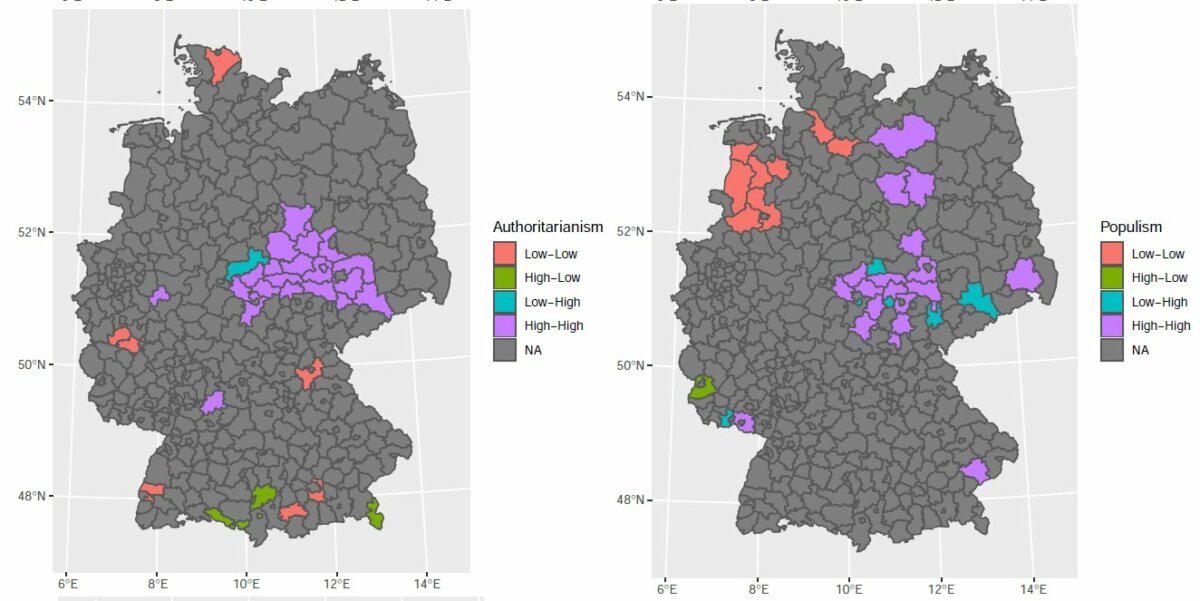The notion of ‘place’ is currently a hot issue in radical right research. But in many cases, it is not entirely clear what different authors mean by ‘place’. In a recent article, Theresa Bernemann and I take a long hard look at the literature and identify four distinct aspects of ‘place’. We then make use of the geo-referenced data that we collected under the auspices of the SCoRE project to evaluate the relative importance of these four aspects for the distribution of far-right attitudes in Germany. Perhaps unsurprisingly, location in the former GDR and place resentment (the feeling that one’s locality does not get the recognition and resources it deserves) have strong effects, whereas objective indicators of deprivation are of much lesser importance.
The full article has now been published in European Political Science Review (Open Access).
- Arzheimer, Kai and Theresa Bernemann. “‘Place’ Does Matter for Populist Radical Right Sentiment, but How? Evidence from Germany.” European Political Science Review 16.2 (2024): 167-186. doi:10.1017/S1755773923000279
[BibTeX] [Abstract] [HTML]The notion of ‘place’ has become a central concern in research on the populist radical right (PRR), but scholars seem to have different things in mind when talking about how geography affects individual political attitudes. In our paper, we therefore aim to structure the debate on the impact of place and to understand exactly how place affects PRR attitudes (nativism, right-wing authoritarianism, and populism). Conceptually, we identify four potentially relevant aspects of ‘place’ that underpin much of the current literature: place-related attitudes (localism and resentment), place-specific living conditions, socio-demographic composition, and characteristics unique to a particular place, i.e., its local history and culture. We also discuss how these aspects are related and how they may interact. Empirically, we assess the relative importance of these four aspects of place for PRR sentiment in Germany, a country that is particularly well suited to this type of analysis. Using fine-grained geocoded survey data collected prior to the 2017 election, we find that (1) there is considerable spatial variation and clustering in PRR attitudes, (2) a place’s socio-demographic composition and (3) place resentment account for much of this, while (4) localism has weaker effects. We find (5) no relevant interaction between localism and place resentment, (6) no substantial evidence that mediation through place-related attitudes leads to an underestimation of the other aspects, and (7) no evidence for effects of the unique culture or history of the places we studied. Moreover, (8) location in the former GDR still has a substantial impact, whereas (9) other place-specific conditions (deprivation, demographic decline, migration, rurality) that could be addressed by policy interventions have no or rather weak effects. We conclude that PRR sentiment in ‘places that don’t matter’ results also, though by no means exclusively, from a lack of recognition.
@Article{arzheimer-bernemann-2023, author = {Arzheimer, Kai and Bernemann, Theresa}, title = {'Place' Does Matter for Populist Radical Right Sentiment, but How? Evidence from Germany}, journal = {European Political Science Review}, year = 2024, volume = {16}, number = {2}, pages = {167-186}, abstract = {The notion of 'place' has become a central concern in research on the populist radical right (PRR), but scholars seem to have different things in mind when talking about how geography affects individual political attitudes. In our paper, we therefore aim to structure the debate on the impact of place and to understand exactly how place affects PRR attitudes (nativism, right-wing authoritarianism, and populism). Conceptually, we identify four potentially relevant aspects of 'place' that underpin much of the current literature: place-related attitudes (localism and resentment), place-specific living conditions, socio-demographic composition, and characteristics unique to a particular place, i.e., its local history and culture. We also discuss how these aspects are related and how they may interact. Empirically, we assess the relative importance of these four aspects of place for PRR sentiment in Germany, a country that is particularly well suited to this type of analysis. Using fine-grained geocoded survey data collected prior to the 2017 election, we find that (1) there is considerable spatial variation and clustering in PRR attitudes, (2) a place's socio-demographic composition and (3) place resentment account for much of this, while (4) localism has weaker effects. We find (5) no relevant interaction between localism and place resentment, (6) no substantial evidence that mediation through place-related attitudes leads to an underestimation of the other aspects, and (7) no evidence for effects of the unique culture or history of the places we studied. Moreover, (8) location in the former GDR still has a substantial impact, whereas (9) other place-specific conditions (deprivation, demographic decline, migration, rurality) that could be addressed by policy interventions have no or rather weak effects. We conclude that PRR sentiment in 'places that don't matter' results also, though by no means exclusively, from a lack of recognition.}, html = {https://www.cambridge.org/core/journals/european-political-science-review/article/place-does-matter-for-populist-radical-right-sentiment-but-how-evidence-from-germany/7C639AAC5F6B1BC2F6324F7D57136827}, pdf = {https://www.cambridge.org/core/services/aop-cambridge-core/content/view/7C639AAC5F6B1BC2F6324F7D57136827/S1755773923000279a.pdf/place-does-matter-for-populist-radical-right-sentiment-but-how-evidence-from-germany.pdf}, doi = {10.1017/S1755773923000279} }
Or, if that is too much right now, just watch the video for a two-minute summary.



Reposts
Likes